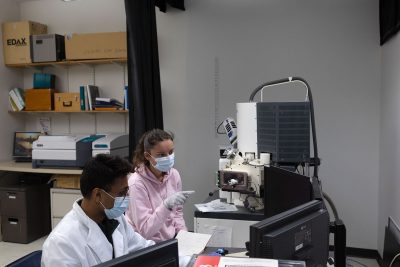The BU chapters of the Society of Hispanic Professional Engineers and the National Society of Black Engineers are working together to make a more inclusive environment for underrepresented members of the engineering community.

SHPE focuses on professional development, cultural events, volunteering and building the community of Hispanic students within the BU engineering program.
When current president Rosangel Ramos Espinoza came across the organization, she said she knew she found her family on campus.
“If it wasn’t for SHPE, there wasn’t a place, or like in my classes or something, [where] I could feel that there was like a Hispanic community,” Espinoza said. “It helps us know that we have a community on campus even though it’s not very visible, it’s there.”
The organization’s hosts activities including Computer-Aided Design workshops, volunteering at the Greater Boston Food Bank and celebrating the Day of the Dead, Espinoza said.
Meanwhile, NSBE focuses on building a community of Black students in BU engineering, professional development and helping members with academics.
“We also do weekly study nights on Tuesdays where we provide a space for collaborative studying and music,” said NSBE president Ethan Strauther. “Last semester, we raised money to feed the homeless in Boston as part of our mission as well just to provide for our community.”
The two organizations have collaborated many times as well, including a networking event Feb. 3. The two clubs have also hosted alumni receptions, with alumni providing mentorship and job opportunities for members.
“We are kind of the smallest minorities on campus,” Strauther said. “So it’s good for us to kind of band together and provide for our members.”
Strauther noted how there are not a lot of Black people at BU, or in STEM, and even less in engineering.
“You can ask any Black [engineering student], they’ll tell you, maybe they’ll have one Black person in their class, or two Black people in all their classes per year, which is very slim,” Strauther said.
Because engineers are people who discover solutions to a wide range of problems, having diversity in the field is important, Espinoza said.
“Having the diversity allows the solutions to actually advocate for the majority of communities as possible,” Espinoza said. “So when there’s a lack of diversity, some of the solutions may not be adequate for everyone.”
The focus shouldn’t be the value of diversity, but how to correct the problems in an environment that does not recognize the talents and input of everybody, Roscoe Giles, professor in the Department of Electrical and Computer Engineering in the College of Engineering, said.
“If you encounter an environment which is not diverse, then your question ought to be, ‘What’s wrong with that environment?’” Giles, who is also a founding faculty member of the Faculty of Computing and Data Sciences at BU, said.
The lack of Black and Hispanic student representation in the engineering department is also reflected in the diversity of its faculty, Espinoza and Strauther said.
“I personally have never had a black professor in engineering,” Strauther said.
A diverse faculty with different experiences and ways of thinking is necessary because students need exposure to a variety of scenarios they might face later in their professional lives, Enrique Gutierrez-Wing, a master lecturer in the Department of Mechanical Engineering at BU, said.
Gutierrez-Wing, who grew up in Mexico and earned his PhD in London, said although in general he feels he is treated equally, he has concerns about faculty from different countries being treated differently during the hiring process.
“I think that’s something that BU needs to solve,” Gutierrez-Wing said. “There’s no real oversight from the University on the hiring process, so this kind of thing can happen and it’s really bothersome.”
Giles said that recent efforts by the University are helping create a more diverse culture.
“I’m hopeful that with some of the intention that’s been built around anti-racism and our efforts to educate the community in that direction and to make conscious choices that way, that we’ll see a benefit of that in terms of the environment here and the diversity at the university,” Giles said.
Correction: The word “diverse” has been removed from the lede to better reflect the original message of the article.



























































































































